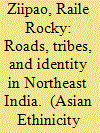| Srl | Item |
| 1 |
ID:
185504


|
|
|
|
|
| Summary/Abstract |
Frontier tribes, inhabiting the Indo (Naga)-Myanmar border, are at the fringe of the nation-states. They remain outside the radar of connectivity and development. The international boundary line demarcated during the colonial rule, pierces through the middle of many villages. This was reinforced by the post-colonial Indian and Myanmar States, thus deepening the contestation between state and tribal society(s). The Indo (Naga)-Myanmar borderland, elicits the case of nation-state construction as opposed to what Lefebvre posits geographical space, as ‘socially constructed’. The distortion of tribal land and territory in the forms of fencing and securitization amounts to the denial of a tribe’s agency and erasure of their shared history and social relation. The paper charts out the ramification of the colonial state making project in the contemporary frontier tribes. It unfolds the contestation, presence and absence of the state in the borderlands and posits for development with justice.
|
|
|
|
|
|
|
|
|
|
|
|
|
|
|
|
| 2 |
ID:
174792


|
|
|
|
|
| Summary/Abstract |
Along with military expeditions and social and anthropological surveys, road-building projects were prominent strategies of the British in India when it came to dealing with tribes and territorialization of the frontier regions. Roads for territorial expansion and resource extraction were the core agenda of the colonial project in Northeast India. The post-colonial Indian state on the other hand built roads in the region for securing the borders, promoting national integration, and linking external markets. This article posits that road building has always been an act of power, which has at different times been aimed at smoothening relationships, securing borders, (dis)connecting people, enabling trade, creating spaces of contestation, or diluting boundaries between varied ethnic groups. The article analyzed the colonial state-making project through road construction and linked to the contemporary Indian state approach to infrastructure development in tribal-dominated areas of Northeast India.
|
|
|
|
|
|
|
|
|
|
|
|
|
|
|
|